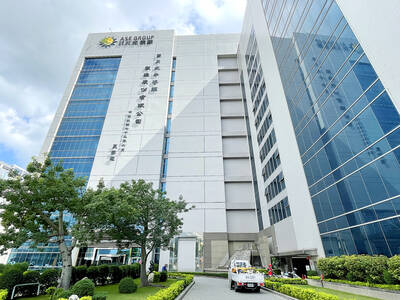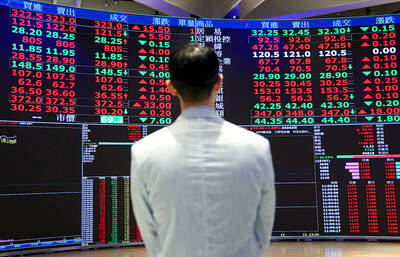Motech Industries Inc (茂迪) led shares of Taiwanese solar cell makers higher in Taipei trading yesterday after Japan said it planned to offer subsidies and tax breaks to encourage households to install more solar panels.
Motech, the nation’s biggest solar cell maker, jumped 6 percent to close at NT$249, its biggest gain since May 5, on the over-the-counter GRETAI Securities Market. Gintech Energy Corp (昱晶能源), the No. 2 maker, advanced 1.8 percent to NT$231.50, while E-Ton Solar Tech Co (益通光能) climbed 5.2 percent to NT$378.
Solar cells are made from silicon wafers and are used to convert sunlight into electricity.
Japan plans to offer subsidies and tax breaks as early as next year to encourage households to install solar panels as part of efforts to cut greenhouse gases.
The government will also promote the use of biofuels, geothermal energy and hydrogen fuel by oil refiners and gas companies, a trade ministry committee said in a statement released in Tokyo yesterday.
Japanese Prime Minister Yasuo Fukuda announced on June 9 that Japan aims to reduce gases blamed for global warming by as much as 80 percent by 2050. Japan plans to boost installation of solar panels tenfold by 2020.
Details of how much the government will pay for the incentives have yet to be worked out. The committee estimates the cost of installing panels is ¥2.3 million (US$21,300) per household. It predicts the cost will halve in five years because subsidies will boost demand and spur competition, bringing down prices.
Between 1994 and 2005, Japan provided as much as ¥70,000 to households in subsidies for installing solar panels. A revival would help kick-start the industry, which had a setback when the subsidies ended, the report said.
Japan’s greenhouse emissions rose 6.2 percent in the year ended March last year from the level in 1990, the environment ministry said.

EXPANSION: The investment came as ASE in July told investors it would accelerate capacity growth to mitigate supply issues, and would boost spending by 16 percent ASE Technology Holding Co (ASE, 日月光投控), the world’s biggest chip assembly and testing service provider, yesterday said it is investing NT$17.6 billion (US$578.6 million) to build a new advanced chip packaging facility in Kaohsiung to cope with fast-growing demand from artificial intelligence (AI), high-performance-computing (HPC) and automotive applications. The new fab, called K18B, is to commence operation in the first quarter of 2028, offering chip-on-wafer-on-substrate (CoWoS) chip packaging and final testing services, ASE said in a statement. The fab is to create 2,000 new jobs upon its completion, ASE said. A wide spectrum of system-level chip packaging technologies would be available at

Taiwan’s foreign exchange reserves hit a record high at the end of last month, surpassing the US$600 billion mark for the first time, the central bank said yesterday. Last month, the country’s foreign exchange reserves rose US$5.51 billion from a month earlier to reach US$602.94 billion due to an increase in returns from the central bank’s portfolio management, the movement of other foreign currencies in the portfolio against the US dollar and the bank’s efforts to smooth the volatility of the New Taiwan dollar. Department of Foreign Exchange Director-General Eugene Tsai (蔡炯民)said a rate cut cycle launched by the US Federal Reserve

HEAVYWEIGHT: The TAIEX ended up 382.67 points, with about 280 of those points contributed by TSMC shares alone, which rose 2.56 percent to close at NT$1,400 Shares in Taiwan broke records at the end of yesterday’s session after contract chipmaker Taiwan Semiconductor Manufacturing Co (TSMC, 台積電) hit a fresh closing-high amid enthusiasm toward artificial intelligence (AI) development, dealers said. The TAIEX ended up 382.67 points, or 1.45 percent, at the day’s high of 26,761.06. Turnover totaled NT$463.09 billion (US$15.22 billion). “The local main board has repeatedly hit new closing highs in the past few sessions as investors continued to embrace high hopes about AI applications, taking cues from a strong showing in shares of US-based AI chip designer Nvidia Corp,” Hua Nan Securities Co (華南永昌證券) analyst Kevin Su

Nvidia Corp’s major server production partner Hon Hai Precision Industry Co (鴻海精密) reported 10.99 percent year-on-year growth in quarterly sales, signaling healthy demand for artificial intelligence (AI) infrastructure. Revenue totaled NT$2.06 trillion (US$67.72 billion) in the last quarter, in line with analysts’ projections, a company statement said. On a quarterly basis, revenue was up 14.47 percent. Hon Hai’s businesses cover four primary product segments: cloud and networking, smart consumer electronics, computing, and components and other products. Last quarter, “cloud and networking products delivered strong growth, components and other products demonstrated significant growth, while smart consumer electronics and computing products slightly declined,” compared with the